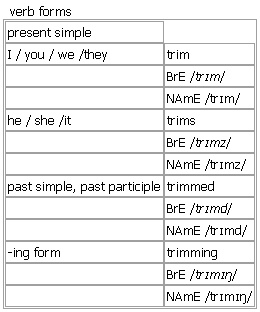 trim
trim

trim [trim trims trimmed trimming trimmer trimmest] verb, noun, adjective BrE [trɪm] NAmE [trɪm]
verb (-mm-)
1. ~ sth to make sth neater, smaller, better, etc, by cutting parts from it
•to trim your hair
•to trim a hedge (back)
• (figurative)The training budget had been trimmed by £10 000.
•a neatly-trimmed beard
2. ~ sth (off sth) | ~ sth (off/away) to cut away unnecessary parts from sth
•Trim any excess fat off the meat.
•I trimmed two centimetres off the hem of the skirt.
3. usually passive ~ sth (with sth) to decorate sth, especially around its edges
•gloves trimmed with fur
Verb forms: 
Word Origin:
Old English trymman, trymian ‘make firm, arrange’, of which the adjective appears to be a derivative. The word's history is obscure; current verb senses date from the early 16th cent. when usage became frequent and served many purposes: this is possibly explained by spoken or dialect use in the Middle English period not recorded in existing literature.
Example Bank:
•The board will be trimmed down to eight members.
•Trim away the lower leaves.
•We need to trim the hedge back.
•We trimmed the bush into a heart shape.
•his neatly trimmed beard
•She wore gloves trimmed with fur.
•The hedge needs to be trimmed back.
•Trim some of the fat off the meat.
•Trim the edges with a sharp knife.
Idioms: ↑in trim ▪ ↑trim your sails
Derived: ↑trim down ▪ ↑trim something down
noun
1. countable, usually singular an act of cutting a small amount off sth, especially hair
•a wash and trim
•The hedge needs a trim.
2. uncountable, singular material that is used to decorate clothes, furniture, cars, etc, especially along the edges, by being a different colour, etc
•The car is available with black or red trim (= the colour of the seats).
•a blue jacket with a white trim
•The kitchen units come in white with a grey trim.
Word Origin:
Old English trymman, trymian ‘make firm, arrange’, of which the adjective appears to be a derivative. The word's history is obscure; current verb senses date from the early 16th cent. when usage became frequent and served many purposes: this is possibly explained by spoken or dialect use in the Middle English period not recorded in existing literature.
Example Bank:
•I have a trim every 4-6 weeks.
•She gave my hair a trim.
adjective
1. (of a person)looking thin, healthy and attractive
•She has kept very trim.
•a trim figure
2. neat and well cared for
Syn: ↑well kept
•a trim garden
Word Origin:
Old English trymman, trymian ‘make firm, arrange’, of which the adjective appears to be a derivative. The word's history is obscure; current verb senses date from the early 16th cent. when usage became frequent and served many purposes: this is possibly explained by spoken or dialect use in the Middle English period not recorded in existing literature.
|
|
